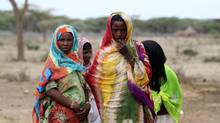Sub-Saharan Africa to See Second Year of Poor Economic Growth, IMF Says

Sub-Saharan Africa’s economic growth will slump to just 3 per cent this year, barely ahead of population growth, as the region falls to its most sluggish expansion rate in the past 15 years, the International Monetary Fund says.
Nearly half of African countries have become dependent on commodity exports, leaving them vulnerable to the collapsing price of oil and mineral products, the IMF says.
While other developing regions such as Asia and Latin America have managed to diversify their economies, Africa has actually become more heavily dependent on commodities in recent years, the IMF says in its regional outlook report, to be released on Tuesday.
Africa’s dependence on commodities is now rivalling the notoriously high levels of dependence in the Middle East, according to the IMF report.
Oil exporters such as Nigeria and Angola will be among the hardest-hit economies this year. Over all, this is expected to be the second consecutive year of poor performance by Africa, following a growth rate of just 3.4 per cent last year – a far cry from the 6-per-cent annual expansion that Africa had enjoyed in the previous decade when the “Africa Rising” narrative took hold.
The only bright spots are a few of the larger oil-importing countries, such as Ivory Coast, Kenya and Senegal, all of which are expected to grow by 6 per cent or more this year.
The bad news for Africa has a wide range of causes: severe drought in countries such as Ethiopia and Malawi, the decline of mineral prices in places such as Zambia and South Africa, the lingering impact of the Ebola crisis in Liberia and Sierra Leone, terrorist attacks in Chad and Cameroon, the oil price collapse in several oil-rich nations, and – in many countries – the Chinese economic slowdown and tighter access to financing.
The IMF says it remains optimistic about Africa in the medium term, noting that the continent is still benefiting from an improved business climate, favourable demographics, growing private consumption, and heavier investment in key infrastructure such as roads, railways and ports.
But in the near term, it criticized many African governments for failing to adjust to the pressures. They need to move faster to create a sustainable tax base and to allow more flexibility in their exchange rates as the “first line of defence” against the commodity crisis, the IMF said.
Countries such as Nigeria have tried to resist the pressure to devalue their currencies, leading to major distortions that create obstacles for investors and traders.
But it is not only Nigeria that is struggling. The policy response of most African commodity exporters “has generally been behind the curve,” the IMF said.
“A year and a half into the shock, and with fiscal and foreign reserves running low and financing constrained, a robust and prompt policy response is needed urgently.”
The sharp decline in revenue from the extractive sector is likely to persist, it said. As a result, many African countries “critically need to contain fiscal deficits and build a sustainable tax base from the rest of the economy.”








